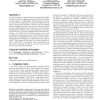Free Online Productivity Tools
i2Speak
i2Symbol
i2OCR
iTex2Img
iWeb2Print
iWeb2Shot
i2Type
iPdf2Split
iPdf2Merge
i2Bopomofo
i2Arabic
i2Style
i2Image
i2PDF
iLatex2Rtf
Sci2ools
112
click to vote
AOSD
2006
ACM
2006
ACM
Reflections on aspects and configurable protocols
The goals of aspect oriented software development (AOSD) and frameworks for configurable protocols (CPs) are similar in many respects. AOSD allows the specification of crosscutting concerns called aspects as separate modules that are woven with the base program as needed. CPs are oriented towards building protocols or services with different quality of service (QoS) properties and attributes out of collections of independent modules, with each configuration customizing the service for a given application and execution environment. As AOSD evolves to address issues in areas such as middleware, operating systems, and distributed computing that have traditionally been the domain of CPs, lessons learned from the development of these frameworks could be useful. The purpose of this paper is to draw parallels between AOSD and CP frameworks, with a specific focus on the Cactus framework and how it compares and contrasts with the aspect-oriented paradigm. Categories and Subject Descriptors D.3...
AOSD | AOSD 2006 | Aspect Oriented Software Development | Concerns Called Aspects | Software Engineering |
Related Content
| Added | 20 Aug 2010 |
| Updated | 20 Aug 2010 |
| Type | Conference |
| Year | 2006 |
| Where | AOSD |
| Authors | Matti A. Hiltunen, François Taïani, Richard D. Schlichting |
Comments (0)

